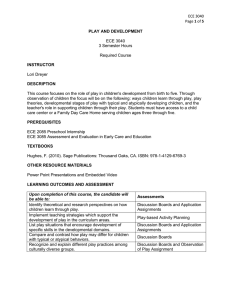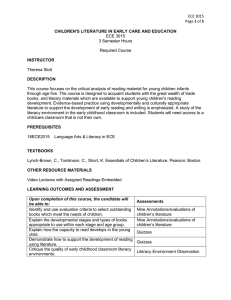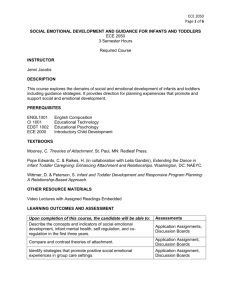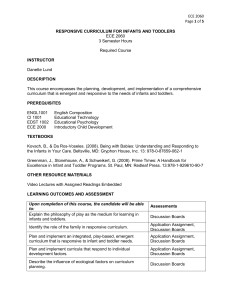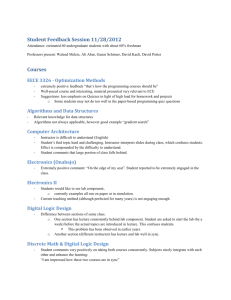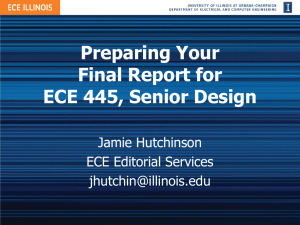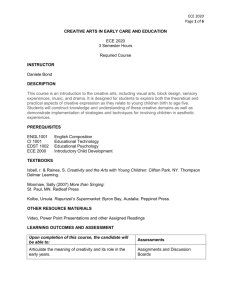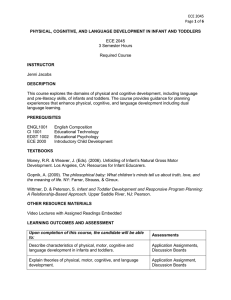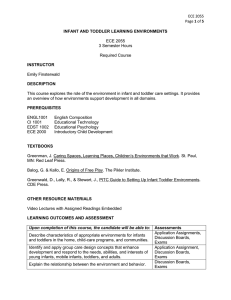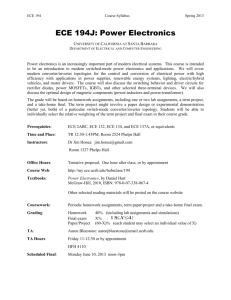ECE 4025 - University of Cincinnati
advertisement
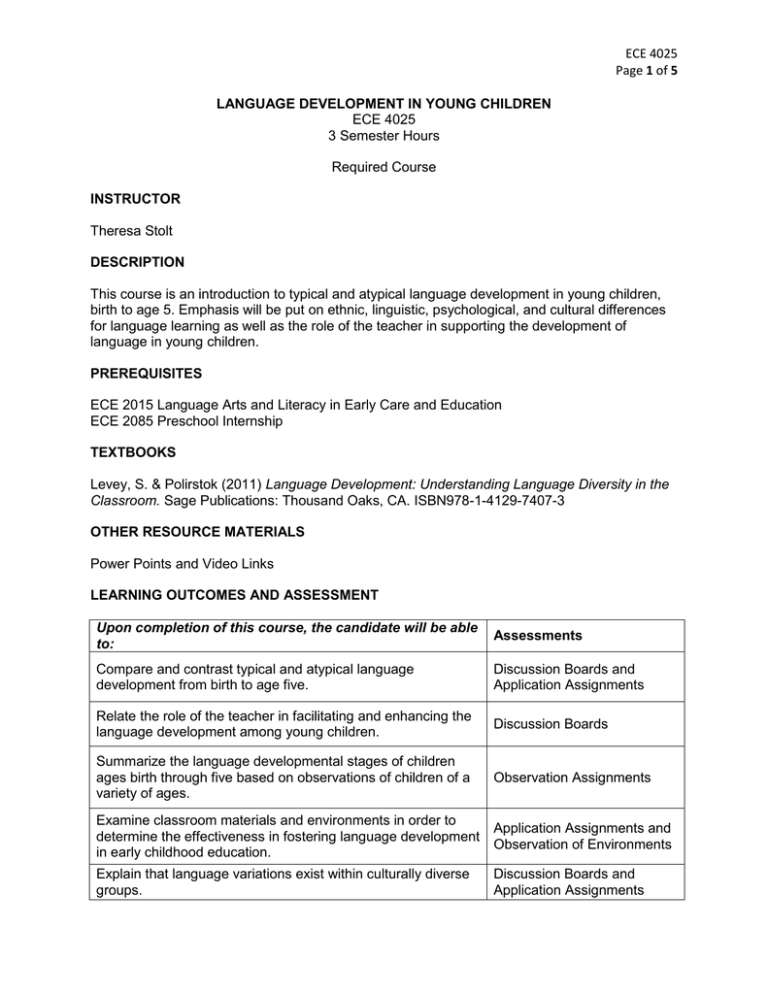
ECE 4025 Page 1 of 5 LANGUAGE DEVELOPMENT IN YOUNG CHILDREN ECE 4025 3 Semester Hours Required Course INSTRUCTOR Theresa Stolt DESCRIPTION This course is an introduction to typical and atypical language development in young children, birth to age 5. Emphasis will be put on ethnic, linguistic, psychological, and cultural differences for language learning as well as the role of the teacher in supporting the development of language in young children. PREREQUISITES ECE 2015 Language Arts and Literacy in Early Care and Education ECE 2085 Preschool Internship TEXTBOOKS Levey, S. & Polirstok (2011) Language Development: Understanding Language Diversity in the Classroom. Sage Publications: Thousand Oaks, CA. ISBN978-1-4129-7407-3 OTHER RESOURCE MATERIALS Power Points and Video Links LEARNING OUTCOMES AND ASSESSMENT Upon completion of this course, the candidate will be able to: Assessments Compare and contrast typical and atypical language development from birth to age five. Discussion Boards and Application Assignments Relate the role of the teacher in facilitating and enhancing the language development among young children. Discussion Boards Summarize the language developmental stages of children ages birth through five based on observations of children of a variety of ages. Observation Assignments Examine classroom materials and environments in order to determine the effectiveness in fostering language development in early childhood education. Application Assignments and Observation of Environments Explain that language variations exist within culturally diverse groups. Discussion Boards and Application Assignments ECE 4025 Page 2 of 5 ALIGNMENT WITH TRANSFORMATION INITIATIVE In view of this conceptual framework and our urban mission, the goal for our Transformation Initiative is to improve the performance of students in high needs schools by preparing educators who recognize the moral imperative to meet the needs of each student. We will prepare educators who are committed to each student, caring about each individual, and competent in evidence-based and data-driven instruction. STANDARDS FOR ALIGNMENT WITH CONCEPTUAL FRAMEWORK Candidates of the University of Cincinnati are committed, caring, competent educators With foundation knowledge, including knowledge of how individuals learn and develop. With content knowledge, able to articulate the central concepts, tools of inquiry, and the structures of their discipline. Who are able to address issues of diversity with equity and possess skills unique to urban education including culturally responsive practice. Who are able to use technology to support their practice. Who use assessment and research to inform their efforts. Who demonstrate pedagogical knowledge, including organizing content knowledge for learning, creating supportive learning environments, instruction, grounded in scientifically based practices, maximizing the opportunity for learning, and professionalism. ALIGNMENT WITH SPECIALIZED PROGRAM ASSOCIATION: National Association for the Education of Young Children (NAEYC) NAEYC Standard 1: Promoting Child Development and Learning. Students prepared in early childhood degree programs are grounded in a child development knowledge base. They use their understanding of young children’s characteristics and needs and of the multiple interacting influences on children’s development and learning to create environments that are healthy, respectful, supportive, and challenging for each child. NAEYC Standard 3: Observing, Documenting, and Assessing to Support Young Children and Families Students prepared in early childhood degree programs understand that child observation, documentation, and other forms of assessment are central to the practice of all early childhood professionals. They know about and understand the goals, benefits, and uses of assessment. They know about and use systematic observations, documentation, and other effective assessment strategies in a responsible way, in partnership with families and other professionals, to positively influence the development of every child NAEYC Standard 4: Using Developmentally Effective Approaches to Connect with Children and Families. Students prepared in early childhood degree programs understand that teaching and learning with young children is a complex enterprise, and its details vary depending on children’s ages, characteristics, and the settings within which teaching and learning occur. They understand and ECE 4025 Page 3 of 5 use positive relationships and supportive interactions as the foundation for their work with young children and families. Students know, understand, and use a wide array of developmentally appropriate approaches, instructional strategies, and tools to connect with children and families and positively influence each child’s development and learning. Ohio Standards for the Teaching Profession Standard 1. Teachers understand student learning and development and respect the diversity of the students they teach. Standard 2. Teachers know and understand the content area for which they have instructional responsibility. Standard 3. Teachers understand and use varied assessments to inform instruction, evaluate and ensure student learning. Standard 4. Teachers plan and deliver effective instruction that advances the learning of each individual student. ALIGNMENT WITH STATE REQUIREMENTS: The course is aligned with the Ohio Standards for the Teaching Profession. ADMINISTRATIVE POLICIES ATTENDANCE Attendance in this class is as important as it would be if you were attending on campus. You should be logging in to the Discussion Board at least 3 days out of every week. It is extremely important to generate and participate in class discussion. You should actively and thoughtfully comment on your classmates' discussion questions and comments. Please remember, however, that the class Discussion Board is for the expressed purpose of discussing issues related to the course. The student’s role is to be an active participant in the dialogue. Please note that technical difficulties do not excuse the student from the responsibility of participation and other assigned work. Infrequent and inconsistent attendance, participation, and work completion will negatively influence the benefits that may be obtained from the course as well as lead to a lower grade. WITHDRAWAL Candidates should consult the Registrar’s web site for information about withdrawal from courses. There are specific dates for online withdrawal - dates related to your responsibility for payment (even for classes that are dropped). Before withdrawing please consider if withdrawal could affect your academic progress toward the completion of a degree. See your academic advisor for assistance. Withdrawal may also negatively impact your eligibility to receive federal financial aid in future terms. ECE 4025 Page 4 of 5 ACADEMIC INTEGRITY The University Rules, including the Student Code of Conduct, and other policies of the department, college, and university related to academic integrity will be enforced. Any violation of these regulations, including acts of plagiarism, cheating, or falsifying field work will be dealt with according to the severity of the misconduct. Dishonesty in any form may result in a failing grade in a course and/or suspension or dismissal from a program (e.g., graduate or undergraduate). Student Code of Conduct: http://www.uc.edu/conduct/Code_of_Conduct.html ELECTRONIC COMMUNICATION POLICY Students are expected to check their email and Blackboard course sites at least twice a week for possible announcements regarding the class. When emailing the instructor, please make sure you sign your name. Include the course name and section number in the subject line of your email. The instructor usually checks email at least every other day, however, a situation may arise where this is not possible. Do not wait until the last day before an assignment is due to contact your instructor if you have questions. Emails are considered private documents between the sender and the receiver. Permission from the sender is required before forwarding to another. EDUCATIONAL ACCOMMODATIONS Any candidate with an identified visual impairment, hearing impairment, physical impairment, communication disorder, and/or specific learning disability that can negatively influence her/his performance should schedule contact the instructor so that reasonable provisions may be made to ensure an equal opportunity to meet all course requirements. GRADING Grades are calculated using a percentage of the total points and letter grades are assigned as follows: Final Percentage 94 – 100 90 – 93 87 – 89 84 – 86 80 – 83 77 – 79 Final Grade A AB+ B BC+ Final Percentage 74 – 76 Final Grade C 70 – 73 67 – 69 64 – 66 60 – 63 < 60 CD+ D D- ECE 4025 Page 5 of 5 COURSE SCHEDULE AND TOPICS WEEK TOPIC 1 Introduction to Language and Learning 2 Theories and Explanations of Language Development 3 Typical and Atypical Language Development 4 Hearing and Listening Skills 5 The Production of Speech Skills 6 The Role of the Brain in Speech and Language 7 Language Development From Birth to Age 3 8 Language Development From 3 to 5 9 Supporting Literacy Skills 10 Narrative Discourse 11 African American English 12 Bilingual Speech and Language Development 13 Language and Literacy Experiences 14 Fostering Family and Teacher Partnerships Exam Week Course Wrap-up
